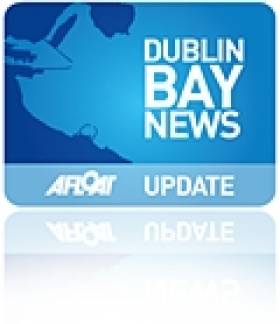Displaying items by tag: Dun Laoghaire Club
Summer BBQ in aid of National Maritime Museum
#MARITIME MUSEUM BBQ – Live music and a full bar are to accompany a Summer BBQ party to be held on Saturday 14 June (8pm) in the Dún Laoghaire Club, in aid of the town's National Maritime Museum of Ireland (NMMI).
Tickets for the barbecue cost €12.00 and are available from the NMMI located in the former Old Mariners Church on Haigh Terrace or at the door of the Dún Laoghaire Club on Eblana Avenue off Marine Road.
For further information of the mid-July evening event contact: 01-2143964 and in general for opening times and activities of the museum which is run by the Maritime Institute of Ireland visit www.mariner.ie
Lecture: Sinking of Submarine HMS Thetis
#LECTURE – A lecture about the sinking of HMS Thetis will be held in the Dun Laoghaire Club, 3 Eblana Avenue next Monday 14th May. The talk will be presented by David Roberts MA -BBC marine presenter.
Roberts will tell the story of the 1939 submarine disaster in Liverpool Bay when 99 men were left to die while carrying out trials. In addition about the delays, mistakes and indecision of the disgraceful cover-up by the Churchill Government and the shocking treatment of those who were left behind.
Standard tickets cost €10 and €5 for concessions and to members of the Maritime Institute of Ireland (M.I.I.). Tickets can be purchased from their maritime museum shop which is on the top (3rd floor) of the Dun Laoghaire Shopping Centre. For further information Tel: 01-2143964 or 085-7528737 and in general about the maritime museum visit www.mariner.ie
Portrait of R.M.S. Leinster Survivor to be Unveiled
#DUBLIN BAY NEWS-Tom Connolly, a survivor from R.M.S. Leinster which was torpedoed off the Kish Bank in 1918, will be remembered when his portrait is unveiled on 31 December.
The unveiling is to take place in the Dun Laoghaire Club, 1 Eblana Avenue, where live music will be the order of the night, starting at 8.30pm. Tickets costs €10 each and can be purchased from the club bar or Costello Jewellers on Cumberland Avenue. Proceeds will be used to provide wheel-chair access to the club.
R.M.S. Leinster was operated by City of Dublin Steam Packet Company (CDSPCo) and on the day of the incident she had 771 passengers (mostly military personnel) and crew on board. Of those 22 were postal sorters from the Dublin Post Office, working in the ships on postal sorting room. The prefix of the vessel, R.M.S. stood for Royal Mail Steamer.
Officially 501 people died, making it both the greatest ever loss of life in the Irish Sea and the highest ever casualty rate on an Irish-owned vessel, though research to date has revealed the names of 529 casualties. To read more click HERE.
Connolly was also a member of the Dun Laoghaire Club and he founded Ireland's first supermarket in Patrick Street, Dun Laoghaire. A model of R.M.S. Leinster was displayed in his supermarket over many years. The model is now in the town's National Maritime Museum of Ireland which is due to re-open in Easter next year, for further information www.mariner.ie
Lecture: Reminiscences’ of Maritime Institute of Ireland and Maritime Museum
Kevin will be recounting his involvement with the acquisition of many of the museum's artefacts in addition to the part he has played in representing the M.I.I. on such issues as sail-training, and the National Monuments Legislation with relation to the Armada finds in Ireland. In addition, Kevin is an experienced yachtsman and he will be touching on that subject too during the evening.
The museum which is situated in the former Mariners Church, Haigh Terrace is due be re-opened with a 'preview' from 16 October 2011 to mark the M.I.I.'s 70th anniversary. The museum is due to be officially opened in Easter 2012. For more about the M.I.I., its museum and activities www.mariner.ie
Heritage Week: Maritime Lecture Seminar Day
Below is listing of the lecture programme and times.
12.30 – 1.30 pm. Neutral Ireland's Role in the Sinking of the Bismark, May, 1941. By Dr. Michael Kennedy, Executive Editor, Documents on Irish Foreign Policy, Royal Irish Academy.
1.30 – 2.30 pm. Traditional Boats of Ireland. - Wooden workboats from all the Maritime Counties of Ireland. By Darina Tully, Lecturer and Maritime Archaeologist.
2.30 – 3.30 pm. Too Many Bags in the Lifeboat. A Lifeboat Tragedy at Bray 1876. By James Scannell, Lecturer and P.R.O of the Old Dublin Society.
3.30 – 4.00pm. Model Boats, A short talk to accompany the exhibition. By Garry Mooney secretary of the Irish Model Boat Club.
4.00 – 5.00 pm. Maritime Guinness, The Ships, Yachts and Barges of the Guinness Dynasty. By Dr. Edward Bourke, Diver, Maritime Historian and Author of "Guinness, the Family, the Business and the Black Stuff"
5.00 – 6.00 pm. Ireland's Armada Heritage. The Story of the Spanish Armada of 1588.The discoveries of the wrecks on the Irish Coast and the recovery of artifacts. By Cormac Lowth, Lecturer, Author and Diver.
For further information contact Barney Yourell Mob: 087 900 7466 No seminar charge – donations accepted
Information in general on the Maritime Institute of Ireland can be found on www.mariner.ie and for all the other events held during the National Heritage Week go to www.heritageweek.ie/
- Dublin Bay News
- Maritime Institute of Ireland
- Irish Model Boat Club
- Dun Laoghaire Club
- Dun Laoghaire Harbour
- M.I.I.
- Dun Laoghaire News
- RNLI Lifeboats
- National Heritage Week
- Heritage Week
- Maritime Lecture Seminar
- Sinking of the Bismark
- Traditional Wooden Irish Boats
- Guinness Ships
- Model Boats
- Ireland's Armada Heritage
- Spanish Armada
- Dun Laoghaire Maritime Museum
Maritime Museum Needs You!
The Maritime Institute of Ireland (M.I.I.) is looking for volunteers to assist in the running of the maritime museum, located in the former Mariners' Church in Dun Laoghaire, Co. Dublin.
A Volunteers Induction Meeting is to be held on 15 February at 8 p.m. in the Dun Laoghaire Club. Please register in advance. For further details click this link.
In addition to the various roles and activities required in the operation of the museum, the institute, are looking for people who can assist from time to time with the setting up of special exhibitions, the making of DVDS to go with displays and website maintenance.
For general information and other updates about the museum log on to www.mariner.ie
AGM of the Maritime Institute of Ireland
The Maritime Institute of Ireland, a registered charity, is run by volunteers that represents maritime interests and organises a winter lecture series mostly held in Dublin
city-centre.
In addition the M.I.I. has a museum and a library in the Mariners Church, Dun Laoghaire.For several years the premises has remained closed due to extensive renovation, it is
intended to re-open in Easter 2011. For information on the M.I.I. www.mariner.ie






























































